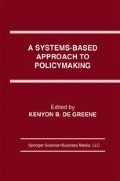Abstract
“Gracious me! I’ve been talking prose for the last forty years and have never known it”. That exclamation was by M Jourdain in Moliere’s Le Bourgeois Gentilhomme. I and my fellow applied social scientists, with no notable exceptions, would have to confess the same ignorance, with regard to policy, not prose, for the last forty years. We have been that way since Lerner and Lasswell announced the emergence of ‘The Policy Sciences’ in 1951, in a book with that title. In policy situations we have gone on doing what we know best to do as social scientists. We have consistently evaded the question of what it is about the ‘policy sciences’ that make themdifferent from the other social sciences. We have been successful in that evasion, I suggest, because we have been sensitive to, and responded appropriately to, changes in context as we move from private to public organizations and from executive to administrative levels. In attributing the reasons for different practices to these contextual differences we have been guilty, I further suggest, of the fallacy of misplaced concreteness. In what follows I will argue that the significant differences are conceptual, not merely contextual. I will go on to suggest how we might now try to realize Lasswell’s vision “that the policy science orientation… will be directed toward the knowledge needed to improve the practice of democracy… to affirm the dignity of man, not the superiority of one set of men” ([Lerner and Lasswell, 1951], p. 10). That next step takes us beyond what we mean by policy to challenge what is meant by science when people talk of policy, or economics, as a science. This issue was also discussed in Chapter 2.
Access this chapter
Tax calculation will be finalised at checkout
Purchases are for personal use only
Preview
Unable to display preview. Download preview PDF.
Reference
Ackoff, Russell L, and Fred E Emery, 1972. On Purposeful Systems, Chicago: Aldine Press.
Angyal, Andras, 1941. ‘A Logic of Systems’. In Fred E Emery (Ed.), Systems Thinking, 1, 27–40, 1981, London: Penguin.
Baburoglu, Oguz. N, 1988, ‘The Vortical Environment: the Fifth in the Emery-Trist Levels of Organizational Environments’, Human Relations, 41, 181–210.
Bertalanffy, Ludwig von, 1950, ‘The Theory of Open Systems in Physics and Biology’, Science, 111, 23–29.
Capek, Milic, 1991, The New Aspects of Time, Dordrecht, The Netherlands: Kluwer.
Churchman, C West, and Fred E Emery, 1966, ‘On Various Approaches to the Study of Organizations’ In John R Lawrence (Ed.), Operational Research and the Social Sciences, London: Tavistock.
Coleman, James, 1966, Equality of Educational Opportunities, Washington, DC: US Government Printing Office.
Cortes, Fernando, Adam Przeworski and John Sprague, 1974, Systems Analysis for Social Scientists, New York: Wiley.
Dahl, Robert A, au]1989, Democracy and Its Critics, New Haven, Yale University Press.
Emery, Fred E (Ed), 1981, Systems Thinking, 2, London: Penguin.
Emery, Fred E, and Merrelyn Emery, 1976, Futures We Are In, Leiden, The Netherlands: Martinus Nijhoff.
Emery, Fred E, and Eric L Trist, 1972, Towards a Social Ecology, New York: Plenum.
Emery, Merrelyn, Searching, Canberra, Australia: Centre for Continuing Education, The Australian National University.
Feibleman, James K, 1979, Assumptions of Grand Logics, The Hague, The Netherlands: Martinus Nijhoff.
Fischer, Frank, 1990, Technocracy and the Politics of Expertise, Newbury Park, California: Sage.
Hall, A D, and R E Fagen, 1956, ‘Definition of System’, General Systems, 1, 18–29.
Harris, Errol E, 1983, An Interpretation of the Logic of Hegel, Lanham, Maryland: The University Press.
Heider, Fritz, 1946, ‘Attitudes and Cognitive Organization’, In Fred E Emery (Ed), 1981, Systems Thinking, 2.
Heise, David R, 1975, Causal Analysis, New York: Wiley.
Lasswell, Harold D, 1971, A Preview of Policy Sciences, New York: American Elsevier.
Leontieff, Wassily, 1971, ‘Theoretical Assumptions and Nonobserved Facts’, American Economic Review, 61, 1–7.
Lerner, Daniel and Harold D Lasswell, 1951, The Policy Sciences, Stanford, California: Stanford University Press.
Lewin, Kurt, 1936, Principles of Topological Psychology, New York: McGraw-Hill.
Maturana, Humberto R and Franciso J Varela, 1980, Autopoiesis and Cognition, Dordrecht, The Netherlands: Reidel.
Meehan, Eugene J, au]1982, Economics and Policymaking; the Tragic Illusion, Westport, Connecticut: Greenwood Press.
Meehan, Eugene J, 1985, Reasoned Argument in Social Science; Linking Research to Policy. Westport, Connecticut: Greenwood Press.
Northrop, FSC, 1947, Logic of the Sciences and Humanities, New York: Macmillan.
Parsons, Talcott, 1937, The Structure of Social Action, New York: McGraw Hill.
Peirce, Charles S, 1982, Writings of Charles S Peirce, 1, Edward C Moore (Ed), Indiana University Press.
Peirce, Charles S, 1984, Writings of Charles S Peirce, 2, Edward C Moore (Ed), Indiana University Press.
Pepper, Stephen C, 1942, World Hypotheses, Berkeley: University of California Press.
Prigogine, Ilya, 1980, From Being to Becoming, San Francisco: Freeman.
Selznick, Philip, 1957, Leadership in Administration, New York: Harpers.
Taylor, Paul, 1961, Normative Discourse, Englewood Cliffs, New Jersey: Prentice-Hall.
Toulmin, Stephen, 1958, The Uses of Argument, Cambridge, England: Cambridge University Press.
Wildavsky, Aaron, 1979, Speaking Truth to Power; The Art and Craft of Policy Analysis, Boston: Little, Brown.
Editor information
Editors and Affiliations
Rights and permissions
Copyright information
© 1993 Springer Science+Business Media New York
About this chapter
Cite this chapter
Emery, F.E. (1993). Policy: Appearance and Reality. In: De Greene, K.B. (eds) A Systems-Based Approach to Policymaking. Springer, Boston, MA. https://doi.org/10.1007/978-1-4615-3226-2_6
Download citation
DOI: https://doi.org/10.1007/978-1-4615-3226-2_6
Publisher Name: Springer, Boston, MA
Print ISBN: 978-1-4613-6417-7
Online ISBN: 978-1-4615-3226-2
eBook Packages: Springer Book Archive

